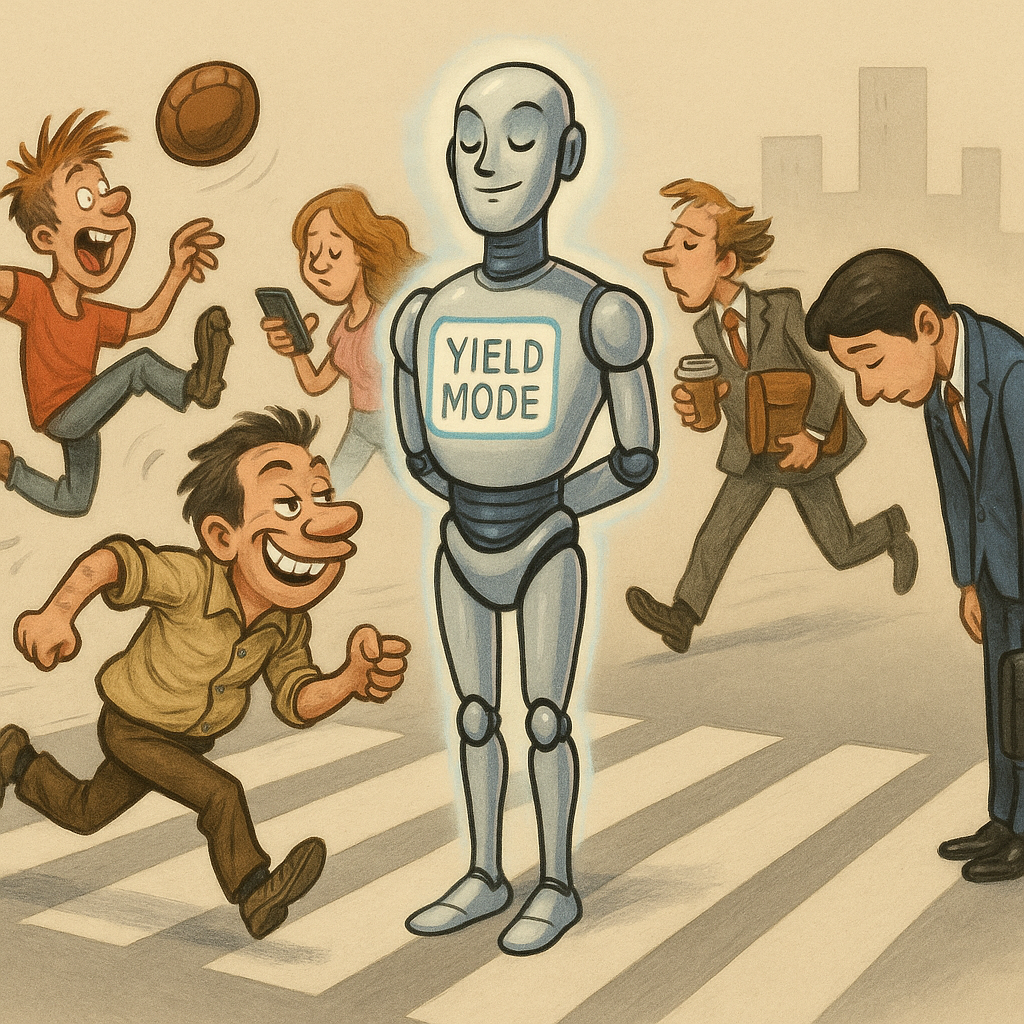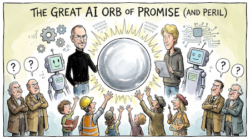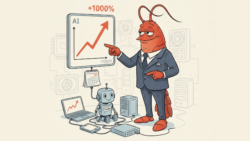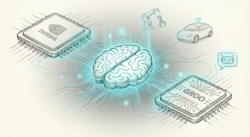- The simple question that will define the future of civilisation
- Horse Guards Parade could unlock the AI revolution
- How to profit from AI’s next phase
Why do you use the sidewalk instead of walking on the road?
Think about it carefully. And hold that thought. Because it could define the future of AI. If not civilisation generally…
This time next month, I’ll be writing to you from the sanity of Japan. “Back to civilisation,” I told my friend’s mum.
She spent most of her life in Tokyo. Back before the Japanese had figured out how to build earthquake-proof high-rise buildings.
So, I don’t know why she snorted in response. Our hometown in Japan really is a much more civilised place. Apart from the many Brazilian metal workers and aged care staff who don’t know how to use sidewalks.
Who would’ve thought that could become a civilisation defining issue?
Using sidewalks, I mean…
You see, he might not realise it, but the author Malcom Gladwell has come up with a surprisingly obvious reason why AI won’t work: humans. We’re too flawed. And that’s putting it politely.
The specific example Gladwell actually mentioned is a bit more explanatory. Like me, he’s spent some time trying to get run over by a robot. Or, in his case, a self-driving car.
Just like me, he failed to get run over. No matter how hard he tried.
When I did it, I got a lot of dirty looks. But I’m not Malcolm Gladwell. Most people celebrated his insight as an astonishing success. It proved that self-driving cars are safe. So safe you couldn’t get run over if you tried.
But Gladwell’s point was that this proved the opposite. Self-driving cars might be safe. But humans are too stupid to reap the rewards. Because we do silly things when we’re too safe. Just can’t help ourselves. And this will undermine self-driving cars.
I reckon that might apply to AI generally. Back to that in a moment.
As Gladwell sees the world, the reason why people use sidewalks is for personal safety. If you walk on the road, you could get hit by a car. Because human drivers are rubbish. So you stick to the sidewalk.
But if self-driving cars are half as good at avoiding collisions as their proponents claim, human pedestrians will begin to wreak havoc on the roads instead.
Gladwell reckons you’ll have kids playing football on the streets of Manhattan in a world of driverless cars. Because the cars will give way to anyone. There will be no downside risk to claiming right of way.
It’s an interesting idea. My first thought was a bit uncharitable: “What an American thing to say!”
Only an American would think that people only avoid walking on the road for their own personal safety. The rest of the world believes interrupting traffic is just wrong.
But the broader point might have something to it…
AI is great. Humans, not so much…
Consider how we’re already sabotaging a better world of AI…
The consulting industry seems to consist of people using AI to create a complex series of reports based on a few bullet points. And then their clients use AI to summarise those reports back into useful bullet points.
AI is creating images for news organisations. But doesn’t that render them a bit meaningless?
AI provides us with its best guess based on all the data on the internet. But that data was thrown out there by flawed human beings.
And humans misinterpret AI’s output. Or are a bit too gullible when AI makes an obvious error.
AI is dishing out legal advice. But can it represent you in court? And will a lawyer represent you after you used AI to replace their advice?
AI robots can deliver pizzas. But they’re very easy to rob.
In Isaac Asimov’s science fiction books, humanoid robots fail to catch on for a very explicit reason. Real men and women can’t compete…in bed.
At least, they don’t want to worry about whether they can compete. And so robots get banished to other, less hands-on functions. And they don’t take on a humanoid appearance, to avoid jealousy.
Perhaps you can think of some ways that human nature has caused AI to go haywire, too.
The question is whether this is a fatal flaw. Are humans too flawed to use AI? Or can we live up to AI’s high expectations of us?
The answer is Japan.
Japanese people don’t just use sidewalks
I was in Japan during a football or rugby World Cup that featured some sort of famous victory. Outside, the Japanese took to the streets to celebrate. They jumped all over each other, sang songs and behaved raucously…for Japanese people.
Then, suddenly, they all scrambled like cockroaches for the sidewalk. The traffic lights had changed. It was the car’s turn to take to the streets.
Each time the pedestrian lights went green, the mad celebration resumed as though nothing had interrupted it.
I realised Japanese people obey traffic laws even if they could be safe in numbers on the street. But why?
You’ve probably seen videos of Japanese fans cleaning up sports stadiums. Other people’s rubbish too.
Do you think they’d stop doing that if robots were assigned to the task?
I’ll give you a hint: there are no janitors at Japanese primary schools. The kids clean the place, including the toilets, each day. It’s part of being Japanese. That’s why we’re moving back…
This isn’t just about Japan. Would my German family give up driving on the Autobahn willingly? Could self-driving cars dodge my mum as she weaves around them, going twice the speed?
Years ago, I was part of a peloton of jaywalkers in London. A German tourist we left on the curb muttered to his children, “Here, everyone goes however they like.” Because in Germany, jaywalkers are called “child murderers” for setting a bad example.
I have always regretted not turning around and responding, “And on the Autobahn, everyone drives as fast as they want!” But I don’t think the Germans would’ve understood my point. They see it as normal. As normal as jaywalking is in central London.
Life isn’t about following the law as it’s written. There is some sort of social contract for how we live our lives. Sometimes it makes us do better than our legislators demand of us. Sometimes it allows us to do worse.
Nobel Laureate FA Hayek called it the distinction between law and legislation. Many laws that govern our day-to-day behaviour are actually technically illegal under the legislation. But we follow those rules as though a policeman were breathing down our necks to enforce them.
The big question is whether a whole new set of “laws” will come to govern our lives in the age of AI. Will people get out of self-driving cars’ way? Or will they behave like Gladwell and me, testing a robot’s nerve in a game of chicken?
One thing we know for sure. The US will be the last place to adopt AI. Unless they start behaving like Japanese people. Who will be the first? Nobody else gives way to a robot out of respect.
But there is hope for AI and humanity yet
I can show it to you, first-hand. Just head to Horse Guards Parade in Whitehall on a Japanese public holiday. (There aren’t many.)
You’ve probably seen tourists behave badly while taking pictures with the Guards there. They step over the line or try to pet the horse. And often get what they deserve.
Now watch what happens when a Japanese person approaches. They will bow before and after taking a picture with the guard. And they will toe the line.
But watch what happens next. Quite often, a tourist from South America or Canada will copy the Japanese person’s respectful demeanour. They might even bow.
It’s terribly funny. But each time that happens, humanity gets one step closer to being ready to adopt AI…and take the next jump in civilisation.
On 7 August, you’ll discover one way you could profit from the world’s adoption of AI, even if the Americans are too rude to make it work in their own country.
It has everything to do with superstar AI stock NVIDIA…and yet nothing to do with it at all.
Until next time,

Nick Hubble
Editor, Investor’s Daily




